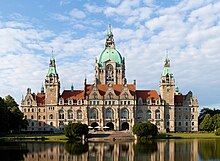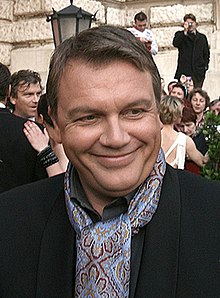
Diana, Princess of Wales was a member of the British royal family. She was the first wife of King Charles III and mother of Princes William and Harry. Her activism and glamour made her an international icon, and earned her enduring popularity.

The House of Windsor is the reigning royal house of the United Kingdom and the other Commonwealth realms. In 1901, a line of the House of Saxe-Coburg and Gotha succeeded the House of Hanover to the British monarchy with the accession of King Edward VII, son of Queen Victoria and Prince Albert of Saxe-Coburg and Gotha. In 1917, the name of the British royal house was changed from the German Saxe-Coburg and Gotha to the English Windsor because of anti-German sentiment in the United Kingdom during the First World War. There have been five British monarchs of the House of Windsor since then: George V, Edward VIII, George VI, Elizabeth II, and Charles III. The children and male-line descendants of Queen Elizabeth II and Prince Philip also genealogically belong to the House of Oldenburg since Philip belonged to the Glücksburg branch of that house.

The House of Hanover, whose members are known as Hanoverians, is a European royal house of German origin that ruled Hanover, Great Britain, and Ireland at various times during the 17th to 20th centuries. The house originated in 1635 as a cadet branch of the House of Brunswick-Lüneburg, growing in prestige until Hanover became an Electorate in 1692. George I became the first Hanoverian monarch of Great Britain and Ireland in 1714. At Queen Victoria's death in 1901, the throne of the United Kingdom passed to her eldest son Edward VII, a member of the House of Saxe-Coburg and Gotha. The last reigning members of the House lost the Duchy of Brunswick in 1918 when Germany became a republic.

The Royal Marriages Act 1772 was an Act of the Parliament of Great Britain which prescribed the conditions under which members of the British royal family could contract a valid marriage, in order to guard against marriages that could diminish the status of the royal house. The right of veto vested in the sovereign by this Act provoked severe adverse criticism at the time of its passage.
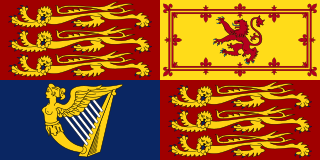
The Royal Standards of the United Kingdom refers to either one of two similar flags used by King Charles III in his capacity as Sovereign of the United Kingdom, the Crown dependencies, and the British Overseas Territories. Two versions of the flag exist, one for general use in Scotland and the other for use elsewhere.
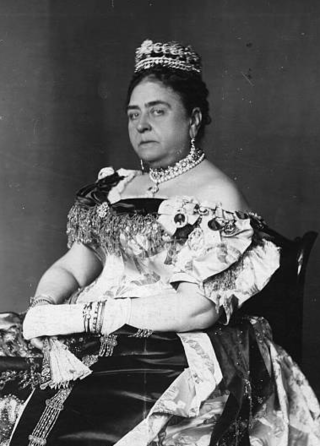
Princess Mary Adelaide of Cambridge, later known as the Duchess of Teck, was a member of the British royal family. She was one of the first royals to patronise a wide range of charities.

George V was the last King of Hanover, the only child and successor of King Ernest Augustus. George V's reign was ended by the Austro-Prussian War, after which Prussia annexed Hanover.
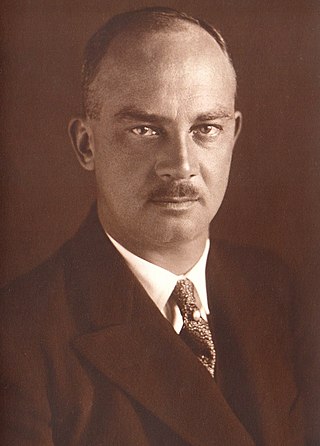
Ernest Augustus Christian George was Duke of Brunswick from 2 November 1913 to 8 November 1918. He was a grandson of George V of Hanover and Christian IX of Denmark. The Prussians had deposed King George from the Hanoverian throne in 1866.

Edward John Spencer, 8th Earl Spencer,, styled Viscount Althorp until June 1975, was a British nobleman, military officer, and courtier. He was the father of Diana, Princess of Wales, and the maternal grandfather of William, Prince of Wales, and Prince Harry, Duke of Sussex.

Prince of the United Kingdom of Great Britain and Northern Ireland is a royal title normally granted to sons and grandsons of reigning and past British monarchs. The title is granted by the reigning monarch, who is the fount of all honours, through the issuing of letters patent as an expression of the royal will.
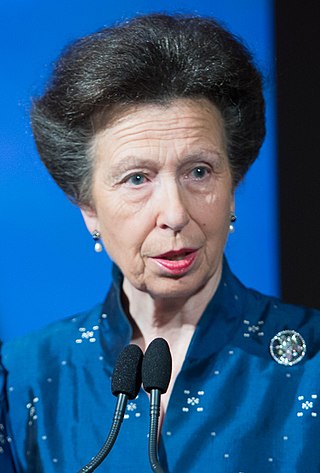
The use of the title of Princess of the United Kingdom of Great Britain and Northern Ireland is entirely at the will of the sovereign as expressed in letters patent. Individuals holding the title of princess are styled "Her Royal Highness" (HRH). On 18 April 1917, the newest granddaughter of Wilhelm II, German Emperor was styled a British princess from birth, even though Germany and Britain were fighting in WWI. Before the First World War, British Princesses also held additional German titles, such as Princesses of Hanover by virtue of being male line descendants of George III; or Princesses of Saxe-Coburg and Gotha, Duchess of Saxony, by virtue of being male line descendants of Prince Albert of Saxe-Coburg and Gotha. George V issued Letters Patent on 30 November 1917, to restrict the automatic assignment of the title "Princess" and the use of the style "Royal Highness" to the following persons:

Ernst August, Hereditary Prince of Hanover is the eldest child of Ernst August, Prince of Hanover, and his former wife Chantal Hochuli. Due to his father's second marriage, he is also the stepson of Caroline, Princess of Hanover, a Monegasque Princess and the sister of Albert II of Monaco.

The Queen is a 2006 British biographical drama film that depicts the events following the death of Diana, Princess of Wales in 1997. Initially, the Royal Family regard Diana's death as a private affair and thus not to be treated as an official royal death, in contrast with the views of Prime Minister Tony Blair and Diana's ex-husband, Prince Charles, who favour the general public's desire for an official expression of grief. Matters are further complicated by the media, royal protocol regarding Diana's official status, and wider issues about republicanism.

Hans Peter Wilhelm "Hape" Kerkeling is a German comedian, TV presenter, author, and actor.

The Queen and I is a 1992 novel and play written by Sue Townsend, a fictional best-selling political satire revolving round the topic of republicanism in the United Kingdom.

The image of Elizabeth II, Queen of the United Kingdom and Head of the Commonwealth from 1952 to 2022, was generally favourable throughout her years as a reigning monarch. Conservative in dress, she was well known for her solid-colour overcoats and matching hats, which allowed her to be seen easily in a crowd. She attended many cultural events as part of her public role. Her main leisure interests included horse racing, photography, and dogs, especially her Pembroke Welsh corgis. Her views on political issues and other matters were largely subject to conjecture. She never gave a press interview and was otherwise not known to discuss her personal opinions publicly.

Irmgard Hermann was a German actress. She worked in film, television, and the stage, appearing in over 160 film and television productions. She was discovered, without formal training, by Rainer Werner Fassbinder who cast her in many of his films. She was awarded the Deutscher Filmpreis for playing Irmgard Epp in Fassbinder's The Merchant of Four Seasons, and again for appearing as Else Gebel, a woman in prison with Sophie Scholl, in Percy Adlon's Fünf letzte Tage.

The Crown is a historical drama television series about the reign of Queen Elizabeth II, created and principally written by Peter Morgan and produced by Left Bank Pictures and Sony Pictures Television for Netflix. Morgan developed it from his drama film The Queen (2006) and especially his stage play The Audience (2013). The first season covers the period from Elizabeth's marriage to Philip, Duke of Edinburgh, in 1947 to the disintegration of her sister Princess Margaret's engagement to Group Captain Peter Townsend in 1955. The second season covers the period from the Suez Crisis in 1956 to the retirement of Prime Minister Harold Macmillan in 1963 and the birth of Prince Edward in 1964. The third season spans 1964 to 1977, includes Harold Wilson's two periods as prime minister, and introduces Camilla Shand. The fourth season spans 1979 to 1990 and includes Margaret Thatcher's tenure as prime minister and Prince Charles' marriage to Lady Diana Spencer. The fifth spans 1991 to 1997 and covers John Major's tenure as prime minister and the breakdown of Charles and Diana's marriage. The sixth season, which will close the series, will cover the Queen's reign into the 21st century.

The Ruby Jubilee of Elizabeth II in 1992 marked the 40th anniversary of the accession of Queen Elizabeth II on 6 February 1952. Contrary to her Silver Jubilee in 1977, there were no widespread public celebrations of the Ruby Jubilee; it was a low-profile event. However, there were some observances to mark the milestone.

